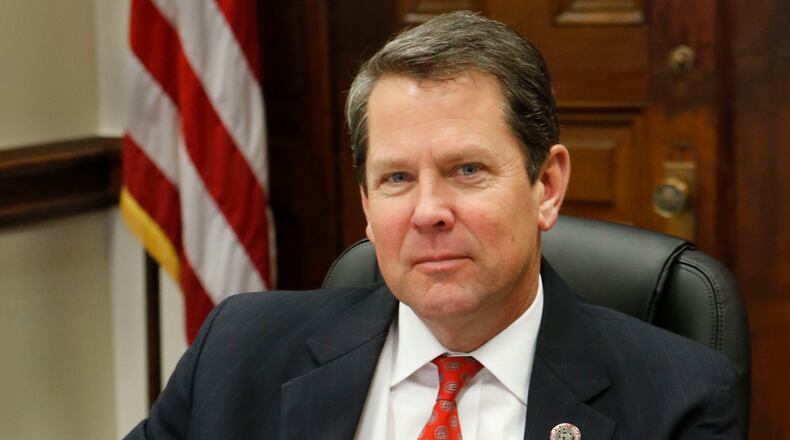As Republican Brian Kemp escalates his attacks on his Democratic opponent’s financial debts, a court hearing Wednesday served as a reminder that money issues could also complicate his campaign for Georgia governor.
The Gwinnett County hearing involved an ongoing lawsuit targeting Kemp from Rick Phillips, a well-connected financier who claims Kemp has failed to repay a $500,000 loan he negotiated and guaranteed for an agriculture firm he once heavily invested in.
It ended after a 90-minute back-and-forth with lawyers from both sides accusing the other of “broken promises” over the loan and a vow from Superior Court Judge George Hutchinson that he would review the arguments and “shortly” issue a decision.
Kemp has made his business background central to his race against Democrat Stacey Abrams, whose debt to the Internal Revenue Service has come under scrutiny from his campaign. But his investment in the northeast Georgia firm Hart AgStrong has threatened to undercut his argument.
The secretary of state invested in the fast-growing company in 2008, and by 2010 he reported owning a roughly one-quarter stake in the firm. After an initial spurt of success, the seed-crushing business struggled with technical problems and poor decisions after it expanded into Kentucky.
Phillips was one of two investors who claimed Kemp and company officials failed to pay back more than $700,000 in loans as the firm’s financial woes mounted. Both of those lawsuits described Kemp as a major player in the firm who agreed to personally guarantee the loans.
One of the lawsuits has since been settled for roughly $200,000, but Phillips has continued to press his case. In an interview, he said Kemp personally requested the loan in 2016 to buy more canola seed and that he repeatedly promised it would be repaid.
“I expected him to keep his word, and he didn’t,” Phillips said. “That speaks volumes about Brian.”
Kemp said in an interview that he’s confident the company will recover and that it will repay the loans. He’s referred to his financial struggles to try to connect with voters who value private-sector experience.
“Like many of you, I’ve had my ups and downs over the last 30 years. My wife, Marty, and I know what it’s like to struggle,” Kemp told business leaders at a Tuesday event. “We lived like many people, day to day, during the recession. But we kept chopping, and things have worked out for us.”
Broken promises?
Kemp’s critics have tried to leverage the legal case to counter his attacks on Abrams’ financial decisions, which have factored prominently in his approach to the November election.
He's assailed her for weeks over deferring $54,000 in taxes to the IRS even as she loaned a similar amount to her campaign. And the Republican Governors Association has aired multiple ads targeting her debt, including one that debuted this week asserting it proves she's "wrong for Georgia."
Kemp spokesman Ryan Mahoney said Wednesday that the company is working to repay its lenders while “radical Stacey Abrams” struggles to explain her debt.
“Abrams should stop tap dancing around the truth,” Mahoney said. “Georgia voters deserve answers.”
Abrams has said she accumulated the debt by helping her parents cover their medical expenses, and that she's paying it back in installments. And while she has largely avoided direct attacks against Kemp, the Democratic Party has seized on the litigation.
The party trumpeted Wednesday’s court proceedings in an email to reporters: “Brian Kemp cheated investors, now he wants to cheat Georgians.” And her allies could also soon echo barbs that Kemp faced in the GOP nominating contest.
The sharpest came from Lt. Gov. Casey Cagle, who made it part of a broader strategy to brand Kemp as an incompetent politician. And his allies launched TV ads that branded Kemp as "insincere" because of the litigation.
Kemp, meanwhile, has steadily distanced himself from Hart AgStrong as its financial problems mounted. His campaign said he now owns about 8 percent.
At the court hearing, the attorneys traded arguments over whether Kemp ducked depositions because he was running for higher office, and each side accused the other of trying to muddy the water during a politically charged race.
“Promises were made, they were broken. That’s a judgment. Simple as that,” said Aaron Kappler, an attorney for Phillips and his RLP Investment firm. He was echoed by Patrick O’Brien, who accused Kemp and Hart AgStrong of flouting their agreement.
“Show me the money. Where is the $500,000? Where is it? I don’t have it anywhere,” O’Brien said. “I would have thought they would have brought this into the courtroom and stacked it on the table.”
Attorneys for the company and for Kemp pushed back vigorously, blaming “sloppy” paperwork for the dispute.
Matt Reeves, who represents Hart AgStrong, accused Phillips of trying to damage Kemp’s political prospects by throwing a “temper tantrum” publicizing the case. And he claimed Phillips reneged on his own agreement, sharing copies of a November email that pointed to a potential settlement.
“It is a case about a broken promise — RLP’s promise to settle the case in 2017,” he said.
OUR REPORTING
It's a busy election year, and The Atlanta Journal-Constitution is keeping the spotlight on the leading candidates for governor, Republican Brian Kemp and Democrat Stacey Abrams. Stories we've done include a look at Kemp's fundraising among industries he regulates and Abrams' tax difficulties. Look for more at ajc.com/politics as the state heads for the general election on Nov. 6.
About the Author
Keep Reading
The Latest
Featured


